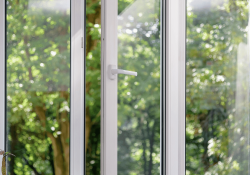Why Vinyl Windows are an Eco-Friendly Choice
March 29, 2025 4:37 pmWhen it comes to making eco-conscious choices for your home, your windows might not be the first thing that comes to mind. However, the materials and efficiency of your windows can significantly impact your environmental footprint. Vinyl windows, in particular, have gained popularity in recent years—not only for their affordability and versatility but also for their eco-friendly attributes. This article explores why vinyl windows are an environmentally sound choice for homeowners who care about sustainability. You’ll learn how they compare to other materials, the eco-friendly benefits they offer, and the truth behind some common misconceptions.
Environmental Impact of Window Materials
Before we dig into the unique advantages of vinyl windows, it’s important to compare them to other common window materials like wood and aluminum in terms of their environmental impact.
Wood Windows

Wood windows have long been a traditional choice due to their aesthetic appeal and natural material sourcing. While wood is a renewable resource, its production still has a substantial environmental impact. Sustainable forestry practices are not universally upheld, leading to deforestation in some regions. Additionally, wood requires regular maintenance, such as repainting or refinishing, which can involve the use of chemicals that are harmful to the environment.
Aluminum Windows
Aluminum windows are strong and lightweight, making them common in modern builds. However, aluminum production is highly energy-intensive. According to research, producing aluminum emits significantly more carbon dioxide compared to creating other window materials, including vinyl. Though aluminum is recyclable, the energy used in its lifecycle can offset these benefits.
Vinyl Windows
Vinyl, or PVC (polyvinyl chloride), stands out when it comes to balancing sustainability with practicality. Unlike wood and aluminum, vinyl windows require less energy to produce, are highly durable, and contribute significantly to energy savings over time. But what makes vinyl windows a truly eco-friendly option? Read on to find out.
The Eco-Friendly Benefits of Vinyl Windows
Vinyl windows offer several environmental benefits that make them a smart choice for eco-conscious homeowners. Here are three key reasons to consider vinyl:
1. Energy Efficiency
One of the most significant contributions vinyl windows make to environmental conservation is their ability to improve energy efficiency in your home. Vinyl windows are known for their excellent insulation properties, thanks to their multi-chambered frames that reduce heat transfer. Many vinyl windows also come with double- or triple-pane glazing, low-emissivity (Low-E) coatings, and gas fills between panes, further insulating your home.
By reducing heat loss in the winter and keeping your home cool in the summer, vinyl windows minimize the need for heating and air conditioning. This means you’ll use less energy, which helps lower your utility bills and reduce your home’s carbon footprint.
2. Recyclability
Vinyl windows are often criticized for being made from plastic, but did you know that modern PVC is recyclable? Many manufacturers now create windows using recycled vinyl, and older frames can often be reprocessed into new products. This reduces the need for raw materials and supports a more circular economy.
However, it’s essential to choose a manufacturer that prioritizes recyclability. When replacing windows, check for recycling programs that accept vinyl frames to ensure they are properly repurposed rather than ending up in landfills.
3. Durability and Low Maintenance
Unlike wood windows, which may rot, or aluminum windows, which can corrode over time, vinyl windows are built to last. Their long lifespan means that fewer replacements are needed, reducing waste overall.
Additionally, vinyl windows require minimal maintenance—no need for frequent repainting or staining. Simply cleaning them with mild soap and water is enough. This low-maintenance approach not only makes your life easier but also reduces the use of toxic chemicals that could harm the environment.
Debunking Myths About Vinyl Windows
Despite their many benefits, vinyl windows are often surrounded by myths that can deter eco-conscious consumers. Here are a few common misconceptions, along with the facts that set the record straight:
1. “Vinyl is just plastic, so it can’t be sustainable.”

While vinyl is derived from plastic, its production is far less energy-intensive than many think. Additionally, modern advancements have made vinyl highly durable and recyclable. Choosing vinyl for long-term use ensures that fewer resources are consumed over time.
2. “Vinyl windows aren’t as durable as wood or aluminum.”
This myth is far from the truth. High-quality vinyl windows are engineered to withstand years of exposure to the elements without warping, cracking, or rotting. Their durability often surpasses wood and rivals aluminum, making them a long-lasting investment.
3. “Vinyl can’t be recycled.”
This misconception stems from earlier years when PVC recycling processes weren’t widely available. Today, many manufacturers incorporate recycled vinyl in their products and offer programs to recycle old frames. Choosing a supplier with transparent sustainability practices can help ensure your vinyl windows are part of a sustainable lifecycle.
4. “Vinyl windows don’t look good.”
Gone are the days when vinyl came in only a few colour options. Modern vinyl windows offer a wide range of finishes and colours, including wood-look textures, to suit any home aesthetic.
Vinyl windows strike the perfect balance between functionality, affordability, and environmental sustainability. Their energy efficiency helps reduce your carbon footprint while significantly lowering utility costs. Their recyclability and durability extend their environmental benefits, making them an eco-conscious choice for modern homeowners. By opting for vinyl windows, you’re not just investing in your home but also contributing to a more sustainable, eco-friendly future.
If you’re considering upgrading your windows, take a look at the vinyl options available near you. Contact local suppliers to learn about recycled or energy-efficient products or schedule a consultation to explore designs that match your home’s style.
